- Home
- Michelle Tea
Mermaid in Chelsea Creek Page 5
Mermaid in Chelsea Creek Read online
Page 5
“Did you hear a word I was saying?” Andrea demanded. “Are you having another seizure? What is going on with you?”
Sophie was embarrassed at spacing out to thoughts of Hennie and her odd, old-world grocery store. She couldn’t tell her mother that she’d been thinking about how the way Hennie wore her chiffon scarves pulled over her head reminded her of how her nana wore similar bits of chiffon bowed around her skinny neck, but to much different effect. “Just bummed that I can’t be at the beach with Ella,” she sighed instead, and it wasn’t much of a lie. The day was warm and bright, with not a single cloud to shade the sun’s brilliance. She could easily imagine the scene just one city over—music leaking from the windows of cars cruising the strip, slices of pizza as big as your head, boys with tiny gold crucifixes glinting on their bare chests—all of it wrapped in the dank, briny stink of the ocean that banged up against the wall. The delighted screams of kids bobbing in the scummy surf. Gulls shrieking as they picked through the trash washed up on the rubble where the concrete wall broke away to sand. Ella making Sophie pick which boy she’d kiss if she absolutely had to, and eeewing at her selection. She’d been looking forward to summer for an entire year. Sophie’s pout was true.
Andrea snorted at her daughter’s regret, finding it not even worth her comment. “Be good to your grandmother. Don’t give her a hard time. Do what she says and be helpful.”
“What’s she gonna make me do?” Sophie whined.
“I don’t know,” Andrea said strictly. “But you’ll do it. Whatever it is. I don’t care if you’re shoveling shit or digging a ditch, you help your grandmother.”
“Is she going to pay me?” Sophie begged. Maybe a summer job wouldn’t be so bad. She could save up and when her mother finally tired of this stupid punishment she’d have tons of dough for pizza and Cokes at the beach.
“Don’t ask her for anything!” Andrea snapped. “In fact, I think the less you interact with each other, the better.”
Andrea brought the car to a halt at the entrance, where a man sat slumped and asleep in a cramped booth. Not only his clothes, torn and worn, but the very skin of his body seemed scavenged from the junkyard. Like a slumbering trashland spirit he snored, smeared in soot and crusted in grime, the soles of his holey boots glistening with gummy slime.
“Ew,” Sophie spat, and Andrea could not even scold her for it. She bit her lip and leaned her head gingerly out the car window.
“Ronald? Ronald?” she called.
Ronald? Sophie thought of Ronald McDonald, and placed the man as the mascot clown of this crazy land. Ronald’s snores were louder than Andrea’s calls. She leaned her elbow on the horn, filling the air with abrasive sound. Ronald jerked on his stool and began to slide off. He was saved by a giant hole in the rear of his dungarees, which had caught onto the stool and held him in place.
“Whaddaya need?” he yelped. “Whaddaya dumpin? Whaddaya got in there?” Ronald squinted like a man who’d lost his glasses. When he squinted his eyes disappeared into the dirty folds of his puffy face.
“Ronald, it’s Andrea. Is my mother around?”
“Andrea! Andrea, Andrea, Andrea!” the man chanted and chuckled, delighted.
“Is he drunk, or retarded?” Sophie asked.
“Sophie!” Andrea’s hand flew out like a startled bird and whacked her daughter in the leg. “That’s just rude.” She returned her attention to the man in the booth, who swayed now, still anchored to his seat by the hole in his pants. Her voice turned oddly tender. “Ronald, I’m looking for Kishka.” The man’s head advanced, like a turtle coming out from its shell. His eyes remained slit but he seemed to be peering in Sophie’s direction, so she gave a halfhearted wave. Ronald waved back. “Ronald, is my mother here?” Ronald nodded, flipping his grubby hand deeper into the dump. “Could you walk Sophie over to her? You know Sophie?” Andrea looked searchingly at the man. “My daughter? Sophie?”
The man leaned, and then leaned further. His grimy face came so close that Sophie could smell him—curbside swill with a shot of whisky. A fume of dirt and booze baked in the midday sun. “Sophie?” he spoke, and when his eyes connected with her it was like a film peeled off them, just for a second—a terrible second. It jolted Sophie and she leaned over her mother and hit the power-window button on the door, sending a pane of glass up between them and the man.
“Ma!” Sophie yelped. “Do you hate me? I’m your daughter, you’re really going to send me off with this guy?” Andrea was always a little neglectful, but sending her off to be murdered by this junkyard goblin was a new level of carelessness.
“Ronald won’t hurt you,” Andrea said quietly. “I’ll be surprised if he can even walk you over there without falling over.”
Sophie shook her head. She couldn’t wait to tell Ella about this. There was no way Ella would be able to stay mad at her when she learned how heinous and cruel her punishment was, that her own mother was leaving her in the care of an inebriated lunatic at the city dump. She hauled herself out of the car and slammed the door, glaring at her mother as she backed away. She imagined the car overheating, spurting great cones of steam into the air. She imagined all four tires popped and sagged, the vehicle lumbering to a stop on warped rims. She wished vengeful destruction onto her mother’s car, stopped just short of howling these curses at the woman as she backed the car back down the gravel slope, the air-freshening tree bouncing cheerfully from the rearview mirror.
As her mother faced her through the windshield the glaring sunlight seemed to bounce between them like a bolt of lightning, and Sophie felt herself invaded with a complicated feeling—there was fear and regret, jealousy and revulsion, hardened love and spinning bewilderment. And Sophie realized those were just the feelings she herself inspired. Intertwined with all these pulses was another low hum—heartbreak.
The sensations took up all the space in Sophie’s rib cage; she could feel it inflate her lungs and speed her heart. She tilted like Ronald had, drunk from this hot shot of emotion. It wasn’t Sophie’s feelings toward her mother she was feeling, it was her mother’s own feelings toward Sophie. She felt the truth of it as clearly as a voice in the air. It wasn’t that she was reading her mother’s mind, she was reading her heart. Mom. She knew what her mother smelled like, knew what she felt like to hug, knew what she sounded like. This was a new sense, but it was every bit her mother, was like wearing her mother somehow, but on the inside. It was fascinating and terrible, heartbreaking and tremendous.
In the moment it happened Andrea felt her emotions pull away from her, then quickly snap back like a great rubber band of feeling. Rattled, she braked the car, took a deep breath in confusion, then continued backing away from her daughter. She pulled away from the dump shaken by that single moment—a millisecond really—when the frantic, constant feelings of her interior had been gone. Just not there. A flash of pure peace had flickered through her, only to be submerged by the tsunami of emotion that rolled back in. Normal. Andrea felt normal again, all churned up inside with worry and fear for her daughter, worry and fear of her daughter, not to mention the rocky, sad emotions that flared up at the sight of Ronald—poor, broken Ronald and his hijacked mind.
Andrea glanced at herself in the rearview mirror—was she still herself? Freckles and wrinkles, her eyes small and sharp, a brow with a good arch, her damn uncontrollable hair held back with a fortress of bobby pins. After so many years of watching her daughter, now when Andrea looked at herself she saw the image of her offspring, too: the reverse of looking at Sophie and seeing her own uncanny reflection, which also happened. They were of one another. Sophie’s wild hair would curl stronger with age, and her cheeks were freckled—not the blizzard scattered across Andrea’s cheeks, more like the faintest markings on a bird’s egg. These were some of the things Andrea had given her.
The car receded into the distance until it was nothing but a dented-up bit of metal reflecting sunlight on the road back to town. At the mouth of the dump, Sophie steadied herself,
shaken by what she’d felt, and then that thirst for salt rose up in her, a craving that cranked her mouth open, had her scavenging the air for a mist of salt off the nearby harbor. She took her breaths deeply, hoping to steady herself, and her tongue rolled around digging for that, that… what did salt taste like? She licked her lips, savoring where her own sweat had dried above her mouth, and her mind teemed with thoughts.
Her mother kept ugly feelings for her in her heart. So it was true. It was a shattering understanding, but an odd comfort as well. To feel suspicious, even paranoid, and then to scold yourself for your suspicions and paranoia—that was the crazy-making carnival ride Sophie had been purchasing tickets for. My mother hates me, how horrible—no, your mother doesn’t hate you, you’re insane—how horrible you are. Now Sophie knew that she wasn’t crazy, that her mom was bad vibing her, deeply. But there was something else, some other feeling nestled in there, so hard to extract from the tangle. Respect? Awe? Awe seemed too grand—Sophie blushed at the idea, why would her mother be in awe of her? But, no, awe. And, the fear she had picked up had a different flavor to it, the sort of fear one might experience upon encountering a tiger, wild and bristling, gorgeous and striped, ready to take you into its mouth full of teeth. Why me? Sophie marveled. Why all that?
Sophie looked down at herself. Still softened with baby fat, in a t-shirt marred with sweat from the sticky car and its busted air conditioning. Cut-off jeans in a dirty fringe around her thighs and an old pair of Vans jammed onto her feet. Even her blonde hair had a negative modifier—dirty blonde, the shade was called. Her cheeks were plump and her eyes, too, appeared plump—chocolatey brown, heavily fringed, somehow both rounded and tilted. Sophie liked her eyes the best, but they were not powerful enough to redeem the mediocrity of the rest of her. In school she did okay—slightly better in English and social studies than in math and science, but not too good or too bad at any of it. No real hobbies or talents to brag about, just an enjoyment of the pass-out game and the company of her slightly wilder, annoyingly unpredictable best friend Ella. But still. Sophie rummaged through herself and came up with a ghost of the feeling that shot off her mother, that swirl of respect and awe and reverence and thought, That’s for me. She straightened her shoulders and turned toward Ronald. He began walking toward her, dragging the stool by the seat of his pants.
“Ronald,” she said. “The stool?” She nodded at the furniture. Ronald was oblivious; the stool seemed to be actually helping him. As his lumbering form swayed, the stool caught him. He tilted backward and the stool’s wooden legs dug into the earth as his rear end came to rest on its seat. It was like Ronald was a new creature, evolved to accommodate his devolution. As he dragged himself closer to Sophie she caught another strong whiff of him. The alcohol wasn’t just coming out on Ronald’s breath—though it was, a flag furling and unfurling from his mouth. Beneath the sour punch of his breath was another odor, the smell of it leaching from his pores. Ronald was pickled. Sophie remembered the way he had begun to peer at her, a strange flicker of clarity in his eyes, and felt the start of something turning inside her. With a full-body jerk she wrenched herself away from it. No. Nope. No freaking way. She was not going to experience the inner realms of Ronald, the drunken city dump mascot. She faced him coldly. How had her mother, usually so bitchy, dealt with him with such patience? How did her grandmother handle him? What would Ella do? Throw a rock at him and run, probably. If the rock seemed clean enough.
“Point, Ronald,” Sophie demanded. “Where is my grandmother? Take your finger and point.” Ronald’s face turned up toward the sky. His swollen eyes pasted themselves shut against the sun and he leaned back heavily against his stool. He was like a sundial, orienting himself. Or perhaps he had passed out. Ronald’s hair was dark and needed washing, badly. Whole locks were held together with a dusky, oily grime. Maybe he had some streaks of gray, or maybe that was just debris, plaster and dust. Chunks of rubble were caught in his tangles. His dark skin was even darker, reddened from his time outdoors. A mist of sweat coated his body, Sophie watched it shimmer on his arms and her thirst for salt galloped inside her. No! Eeew, gross, gross, the grossest! Worse than the rancid debris of the city creek was Ronald’s dirty, sweaty arm, and yet—so salty. Sophie bit her tongue so that it filled her mouth with water. She felt monstrous as a vampire yearning for blood. The water in her mouth helped not at all. The craving inside Sophie wasn’t thirst at all—it was the opposite of thirst.
Ronald, oblivious, righted himself upon his crooked stool and popped his eyes open. For the first time she watched the man focus—on her. A smile ate his face, revealing rows of perfect, white teeth beneath his lips. They surprised Sophie; everything about Ronald seemed ruined; she’d expected a jack-o’-lantern’s grill, jagged and discolored as a ripped chain-link fence.
“I know you.” Ronald nodded his head, happy the way a child is happy, happy at nothing, making no sense. “I know you, do you know me?”
“Yeah, you’re Ronald. I’d like for you to tell me where my grandmother is.”
“You don’t know me.” Ronald shook his head, his words long and mushed by his slow-motion tongue. “That’s not allowed.” Then his arm lifted, and he pointed down the hill. Away from the office her grandmother kept in an Airstream trailer beneath the only shade trees on the property. Away from where the trash grew into mountain ranges on the horizon. Sophie followed the point of his dirty finger, his nails green and fungal, toward a squat, lopsided building, a shed ringed with hulking metal barrels.
“Angel,” Ronald coughed the word wetly, like something that had blocking his air passages. “She’s with Angel.”
“Great,” Sophie clipped. “Thank you.” The man began to tremble back into motion; his feet, jammed sockless into a beaten pair of sneakers, shuffled. The stool’s legs sunk deeper into the soft earth. Ronald was running in place. “Nice to see you,” he croaked. Sophie left him there, began the trek down the hill, her Vans kicking up puffs of dust that coated her bare, sweaty legs. The dump would make her gross, she thought sadly. Her nose would become accustomed to the amazing variety of foul stinks the breeze carried this way and that. The odor of swill decomposing in the sun would become as familiar to her as mown grass. She’d expect her skin to be gritty and smudged. Her hair would clump like Ronald’s into dreadlocks of grease. Just great. She comforted herself by the thought that at least no one worth caring about would see her. At least this wasn’t school, where an overslept morning could send you, disheveled, into the world of catty classmates, the world of boys Sophie just did not want to think were cute—she did not, they were jerks, most of them, serious jerks, could win medals in an international jerk competition, the cream of the jerk crop right there at Our Lady of the Assumption School in Chelsea, Massachusetts—but, they were cute. Several of them were cute. That she thought so made Sophie as mad at herself as at them, the losers. Tripping people as they passed on their way to the pencil sharpener. Sending mortified girls dashing into the bathrooms on false claims of period stains bleeding through their uniforms. Greeting everyone with the salutation, Hey, faggot! Sending phony love notes to students whose loneliness sat on their skin plain as acne. She hated them. But their cuteness was undeniable. She felt a relief at never having to see any of them during this, her punishment summer spent at the dump. She would submit to the grime, become like a feral cat wandering the heaps of trash.
Chapter 5
Sophie saw her grandmother only a smattering of times each year, usually on holidays. Her home was dim and the furniture was old, bought new many years ago, when she had lived there with Sophie’s grandfather, before he disappeared. No one liked to talk about Papa Carl’s disappearance—it brought up in Andrea a sadness Sophie couldn’t bear to witness. It made the world seem topsy-turvy to watch her mother, so strong and harsh, be shoved to the brink of tears so abruptly, her adultness suddenly full of wobble, as if it could tip over and a little-girl Andrea would tumble out. Sophie didn’t like her mom’s bad moods b
ut at least they were consistent, and she’d learned how to maneuver around them. To see this tender, wounded streak exposed paralyzed her, filled her with a strange mixture of love and fear, and the urge to hug her mother and run quickly away. Clearly her mother had loved her father. That Kishka had loved him too was harder to see, as the man’s name brought out of her grandmother a bitter rage that made her cigarette smoke hotter, that made the muscles in her skinny neck tense so that she’d loosen the breezy scarf kept knotted there, sometimes taking it off and wrapping it around her hand, like a boxer taping his fingers together before a fight.
Well, he was a man after all, Kishka would say, and Sophie couldn’t tell if this was Kishka’s understanding, her dark acceptance—it is a man’s prerogative, after all, to leave as he wishes—or, if it was the old woman’s regret at a mistake—she’d believed Carl was special but it turned out he was a man after all, a thing that leaves. Either way it made Sophie shift with discomfort, and so she didn’t mention her grandfather, whom she’d met many times but so long ago she had no memory of him, only photos pasted into yellowy photo albums, baby Sophie sitting on the lap of a faceless man. Faceless because someone—Kishka in her rage or Andrea in her grief—had cut out the offending image, leaving a perfect, round hole, a gap where the gluey page of the album striped through. Sophie found them creepy, and imagined an envelope somewhere containing a confetti of her grandfather’s tiny heads. He’d disappeared, and then they had disappeared him. Sophie hated all of it. She hated that anyone could disappear. She wondered what it meant, but never did she imagine boarding a bus, running away, hopping a train. She thought of a slow shimmer that vanished her.

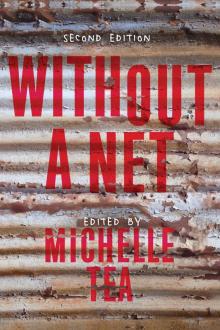 Without a Net
Without a Net Black Wave
Black Wave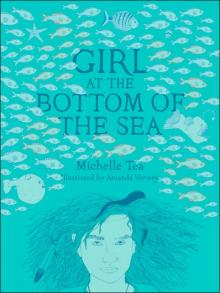 Girl at the Bottom of the Sea
Girl at the Bottom of the Sea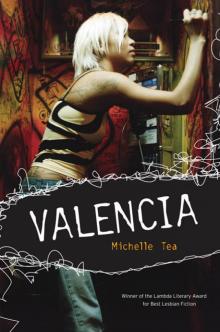 Valencia
Valencia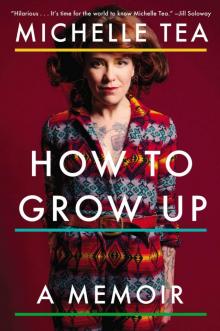 How to Grow Up
How to Grow Up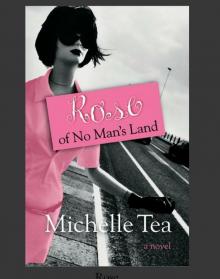 Rose of No Man's Land
Rose of No Man's Land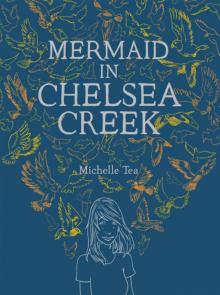 Mermaid in Chelsea Creek
Mermaid in Chelsea Creek